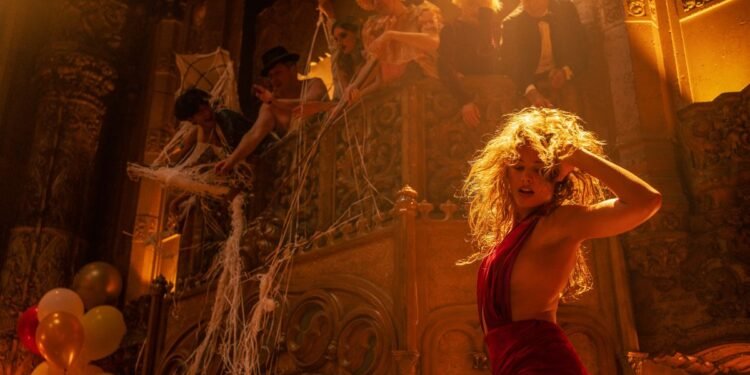The first widely available film stock in America was made with a nitrate base. Highly flammable and barely stable, this nitrate film — used from the earliest days of filmmaking until the introduction of safer acetate film stock in the 1940s and ’50s — became more dangerous with age if it wasn’t cared for properly: It released flammable gas as it decomposed into goo, then dust. In the final stages of its breakdown, it was capable of spontaneous combustion, setting history ablaze if it got hot enough on a summer day.
Countless films were lost in this way. There were fires in a Fox film vault in 1937, in MGM’s in 1965, in the National Archives in 1978. In the silent-film era, projection-booth fires were commonplace, as the heat from projectors was often enough to ignite the nitrate film running through them.
As for the nitrate film stock from that era that survives? Much of it has fallen into decay. In Bill Morrison’s 2002 avant-garde film Decasia, scenes from silent-era films are presented in collage in their eroding state, as images that once depicted great emotion or intrigue are overtaken by the rot of time.
And yet the movie stars that once drew people to these films dreamed of immortality.
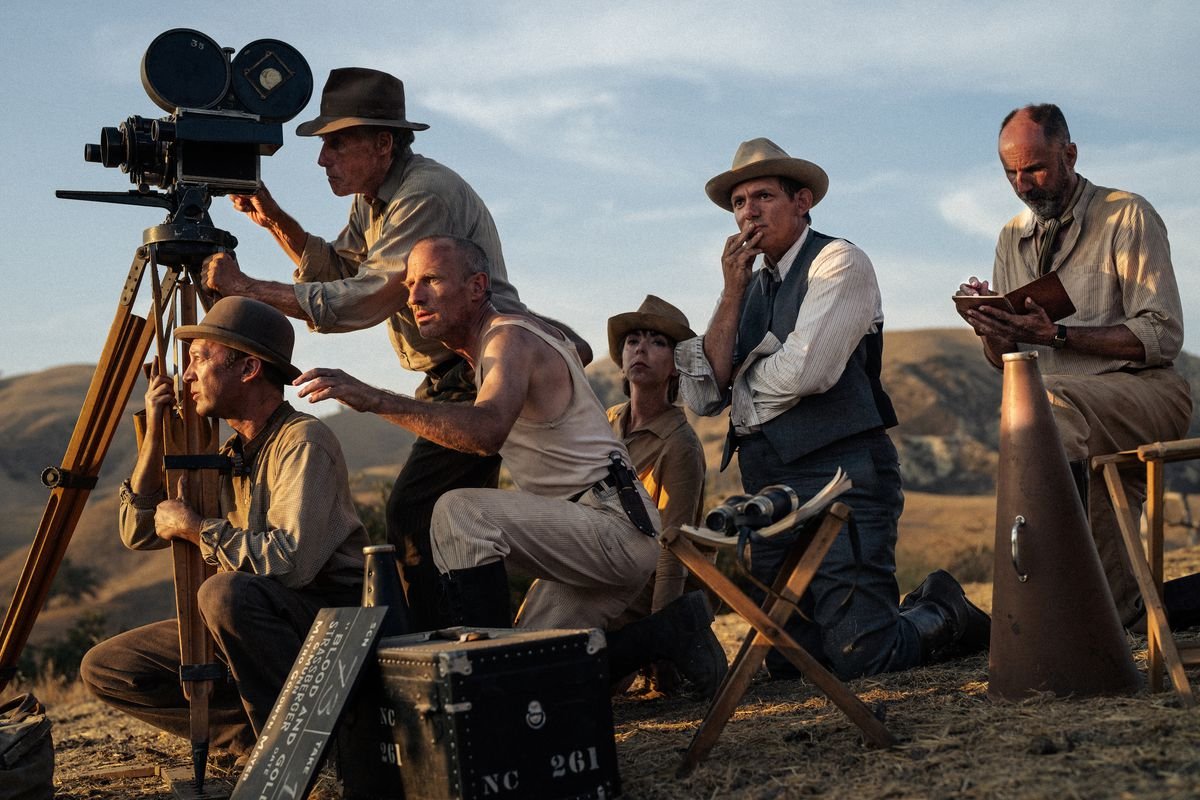
Photo: Scott Garfield/Paramount Pictures
Immortality is what everyone wants in Babylon, the divisive new film from Damien Chazelle, acclaimed writer-director of Whiplash, La La Land, and First Man. It starts at the top: Jack Conrad (Brad Pitt) is the biggest movie star in Hollywood at the peak of the silent-film era, surveying his kingdom with pride, knowing he’s fueling the dreams of the common folk and has built something that will last. Nellie LaRoy (perennial Harley Quinn Margot Robbie) has nothing but a self-selected name and the conviction that she deserves to be as big a star as Conrad. And Manny Torres (Diego Calva) is a waiter to the rich who dreams of making something that lasts, like a movie.
Babylon follows the fates and fortunes of these three and others around them as they diverge and intersect over the course of years. It starts with an extended party, a raucous bacchanal all three of them attend — Jack as a guest of honor, Manny as the help, and Nellie as a party-crasher. Their story is the same one Hollywood continually tells about itself and the people that sustain it: a story about big dreams and the grand life that might follow for a few people who are crazy enough to believe they might come true.
Across Babylon’s 188-minute run time, Nellie and Manny see their stocks rise. The former becomes the star she always believed she was, and the latter becomes a studio executive, all through a lot of grit and a bit of right-place, right-time fortune. Meanwhile, change is on the horizon, as the 1927 premiere of The Jazz Singer throws showbiz off its axis, and Jack Conrad’s world begins to fall apart. Then everyone’s world follows, because fame is fickle and fleeting, and no one gets to be on top forever.
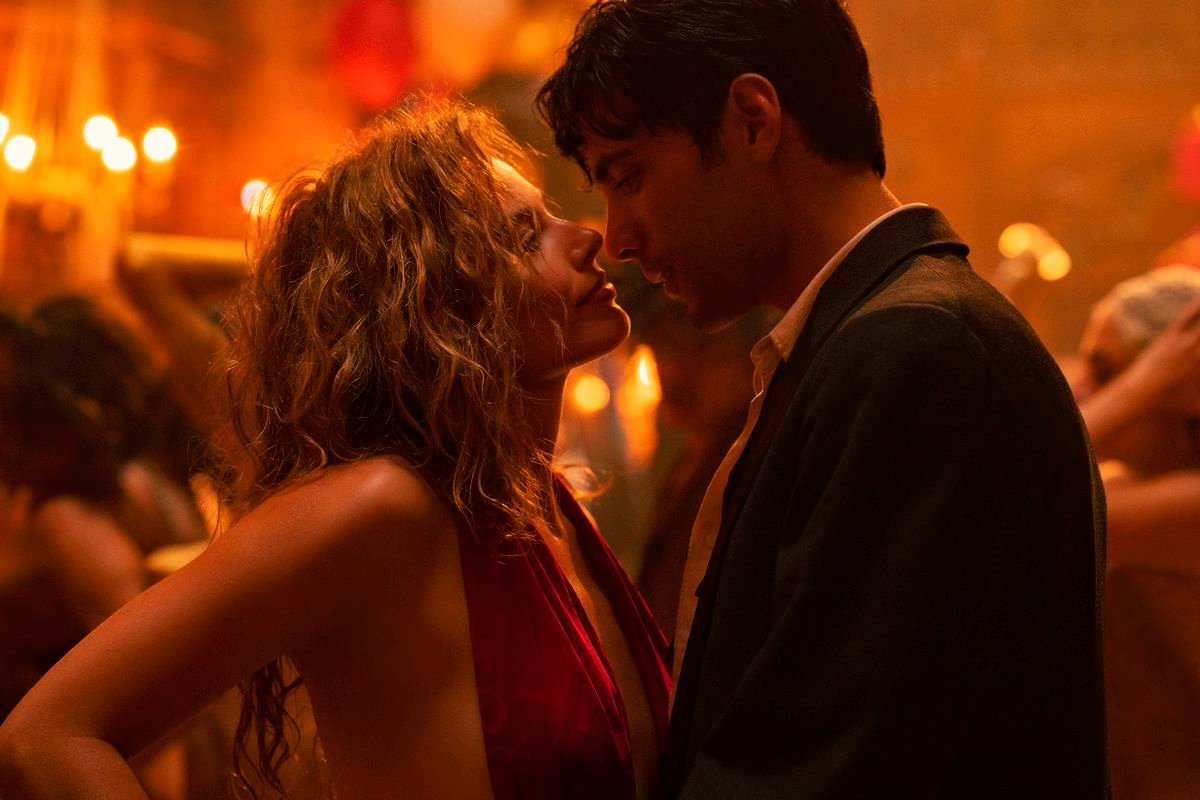
Photo: Scott Garfield/Paramount Pictures
This is a song most movie-lovers can sing by heart, and one Chazelle has been singing in some form or another since Whiplash, his breakout film. His stories are about extraordinary people who dare to dream, who drag themselves from the wreckage — literally, in some cases — to realize that dream and be lionized for it, even if it costs them everything else in their lives. In Chazelle’s cinematic vision, art is more vital and beautiful than life itself, and the people who would set themselves ablaze for art, whether in Earth’s orbit or behind a drum kit, are the noblest of souls.
A message like this — pursuing fame is an act of hubris, and artists are transcendent in their foolish vainglory — is highly dependent on its messenger, and Babylon dances on a razor’s edge from its first frame. Yet Chazelle, alongside his longtime editor Tom Cross and composer Justin Hurwitz, are among the most accomplished dance partners making movies right now.
There’s a musicality to Chazelle’s films as he, Hurwitz, and Cross use the visual medium of film with the improvisational vigor of jazz musicians, and Babylon is their showstopper. The cuts are syncopated to get the audience moving. The color palette is bold and brassy, blurring the line between the images on screen and the horns that fuel them. The camera lingers on performers and performances: a showstopping, manic dance from Nellie LaRoy in the film’s opening bash/orgy, a drunken climb up a hill by Jack Conrad, utterly wasted, right before he miraculously pulls himself together to deliver a perfect take. The tightening of Manny’s brow and lips as he assumes the role of an executive, and does whatever it takes to convince the movers and shakers that he belongs in the room with them.
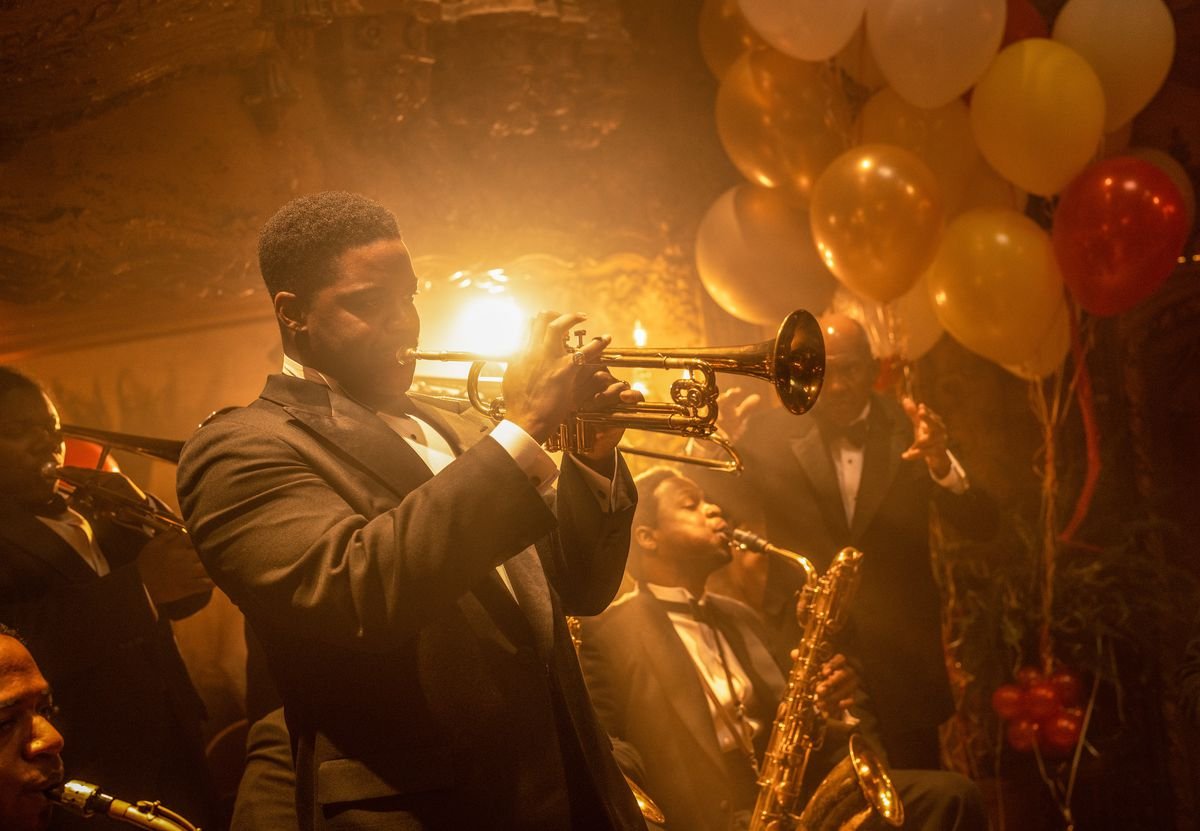
Photo: Scott Garfield/Paramount Pictures
Yet for all of Babylon’s glorying in art and artists, in Hollywood and dreams, it would all be in vain without a compelling reason why. This is where the film is most volatile. Its title deliberately evokes Hollywood Babylon, Kenneth Anger’s notorious (and largely fabricated) 1959 tell-all about the golden age of Tinseltown, a book that helped cement in the public consciousness the idea that the glitz and glamour of show business came part and parcel with a seedy underbelly of sex, drugs, and violence — often at the cost of women and queer people caught under its sensational gaze, and the tabloids that preceded or followed the book’s publication.
Babylon leans into this sensationalism, first with its title, then with its opening party, an orgy that climaxes with an elephant parading through a mansion in order to distract from the body of a girl who overdosed after a sexual rendezvous. As Nellie’s and Manny’s fortunes rise, staying in the game forces them both to make compromises that chip away at their humanity. Nellie burns bright and hot, turning to drugs and gambling. Others, like the burlesque singer Lady Fay Zhu (Li Jun Li), lose their livelihoods to her wanton appetites. Manny’s naked ambition causes him to treat other marginalized people as stepping stones, going as far as to ask Black trumpeter Sidney Palmer (Jovan Adepo) to perform in blackface in order to appease markets in the South, keep a shoot on schedule, and save his bosses’ money.
The beautiful collision between Nellie and Manny at the start of Babylon signals the start of their respective rises. As the film builds toward its conclusion, it tangles them together again in freefall. Their rapid descent reaches its nadir as Manny embarks on a trip to Hollywood’s version of hell, hosted by loan shark and lurid thrillseeker James McKay (Tobey Maguire, one of Babylon’s producers, playing wonderfully against type). In his hands, the salacious orgy of the film’s opening meets its horrific opposite.
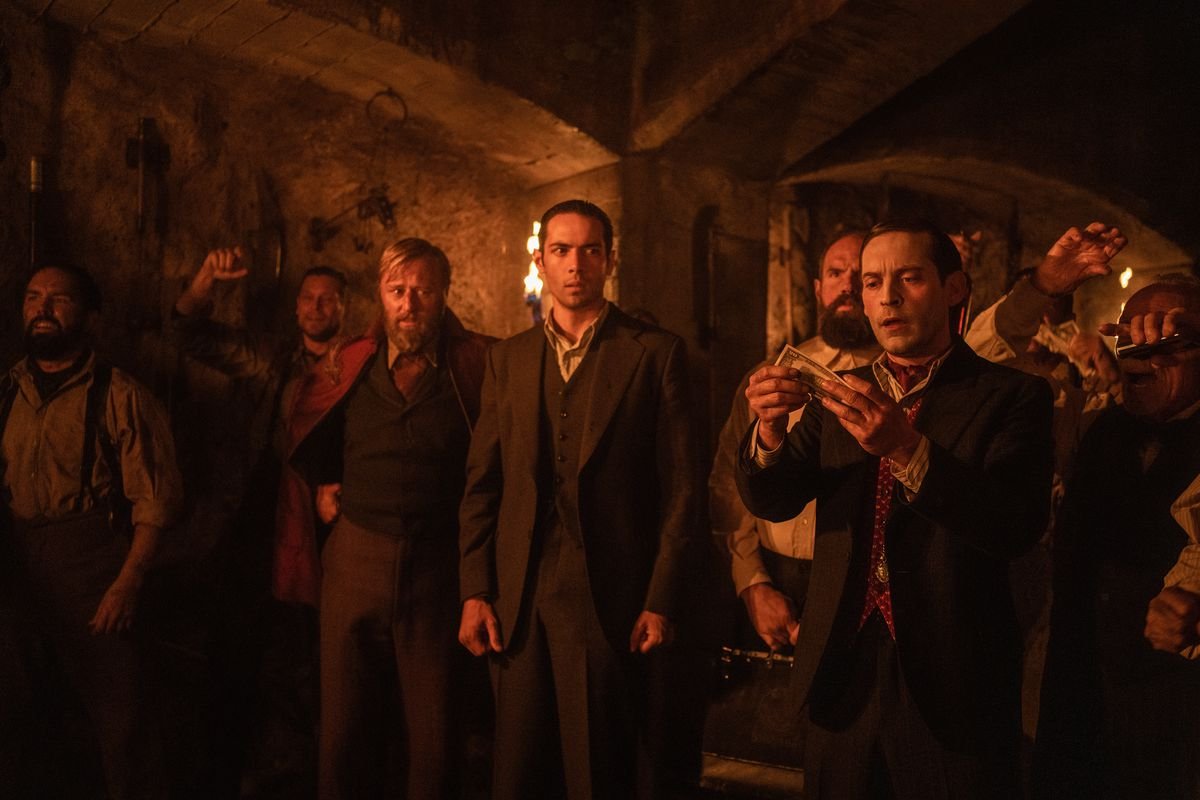
Photo: Scott Garfield/Paramount Pictures
Babylon is long enough that it can cause viewers to wonder — multiple times! — whether sensationalism and navel-gazing are the film’s only tricks. The movie echoes the sensational shock and awe of the star machine, inviting the audience to marvel and recoil at the wonder and horror it has wrought. But Chazelle is deft enough to suggest, more than once, that he’s playing at something deeper and more challenging.
In the broadest reading, Babylon is a profane paean to film as a uniquely communal medium, gathering the collective hopes and dreams of everyone who experiences them. The film celebrates cinema as the ultimate end goal, a worthy reason for these messy, broken people to immolate themselves in the act of creation. In one of the film’s best scenes, Jack Conrad confronts entertainment journalist Elinor St. John (Jean Smart) over a negative profile she wrote. In response, Elinor tells him the truth of things: Neither of them matter. The movies do. There will be other stars and other journalists, but they are all in the service of what the beam of light projects on the silver screen.
This story, however, has been told. We’ve seen it in bona fide classics like Singin’ in the Rain, and in more recent works like the 2011 Best Picture winner The Artist. Both those films are concerned with similar ideas, and set in the exact same era. Chazelle has even already delivered a loving homage to Hollywood in La La Land, his musical about an aspiring actress who sings about the fools who dream. Babylon, in all of its sound and fury, is redundant. And then Chazelle makes one final audacious pivot: He acknowledges this in the text.
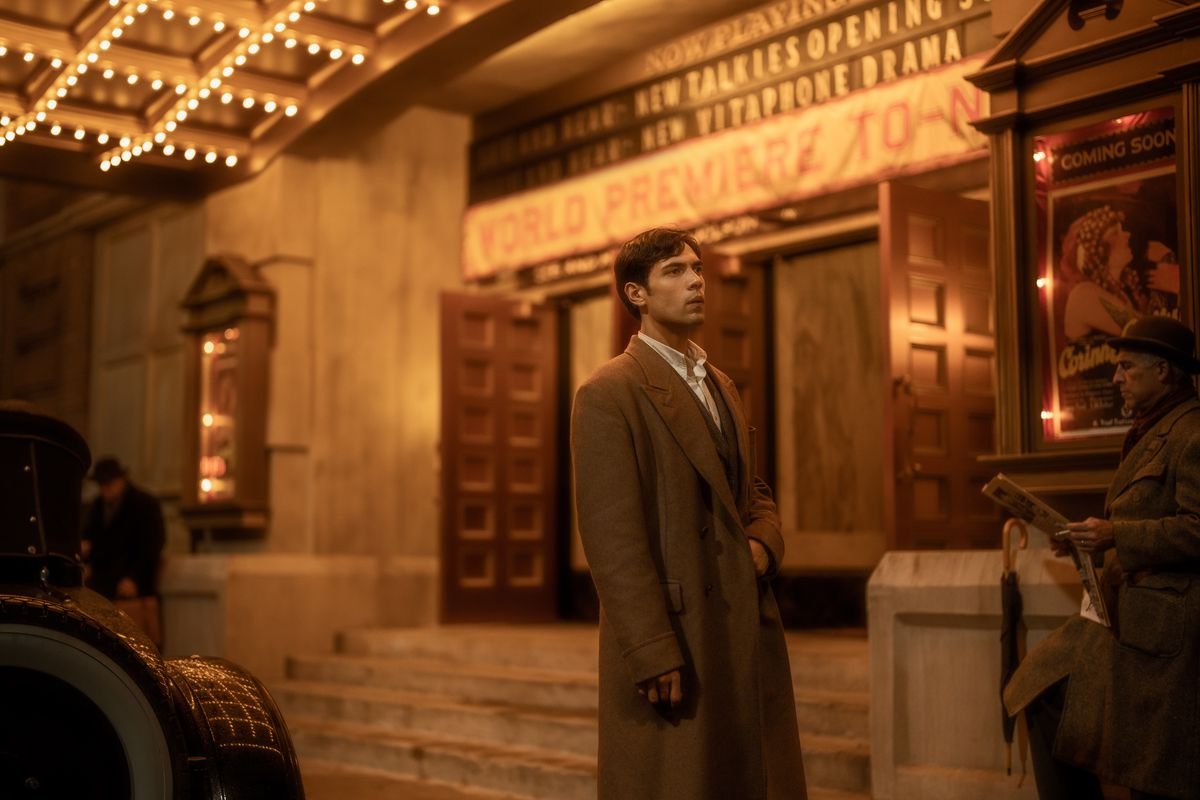
Photo: Scott Garfield/Paramount Pictures
In an astonishing finale, Babylon marries bombast and tragedy in one fell swoop, embracing Chazelle’s hubris as an artist by letting him insert himself into the cinematic canon, while he’s endeavoring to earn his place there at the same time. In its final moments, he isn’t content to just tell another story about the rarefied few who dreamed, and built an empire where countless others could dream along with them. Instead, he weeps over what was destroyed to keep that dream alive, and what’s been forgotten so others can hope to be remembered.
Babylon’s most significant moments don’t come during the big events in Nellie, Jack, or Manny’s stories. They’re the quieter scenes, tracking what happens in the wake of their flaming parabolic arcs. They’re about the people who are forced out of the business or choose to walk away — the queer people forced into hiding to bolster studios’ public image, the marginalized forced to bear indignities so white actors can chase immortality.
This is the Babylon of the film’s title: The burnished image left behind after the people who built it are gone. It is easy to get caught up in the magic of movies and only see Jack Conrad, or Damien Chazelle — and if that’s all you see in Babylon, revulsion may come naturally. But Babylon is also concerned with what happens in the periphery of Hollywood’s white heroes. Chazelle shoots his stars with a lens wide enough that it’s not hard to see who lingers in the periphery, and the parts they have to play. Keep an eye on those people as they come and go, and Babylon becomes a cacophonous dirge for them, weeping for their anonymity in all the beauty that came at their expense. Their nitrate went up in flames and left us with lovely little lies of living forever.
Babylon premieres in theaters on Dec. 23.





























